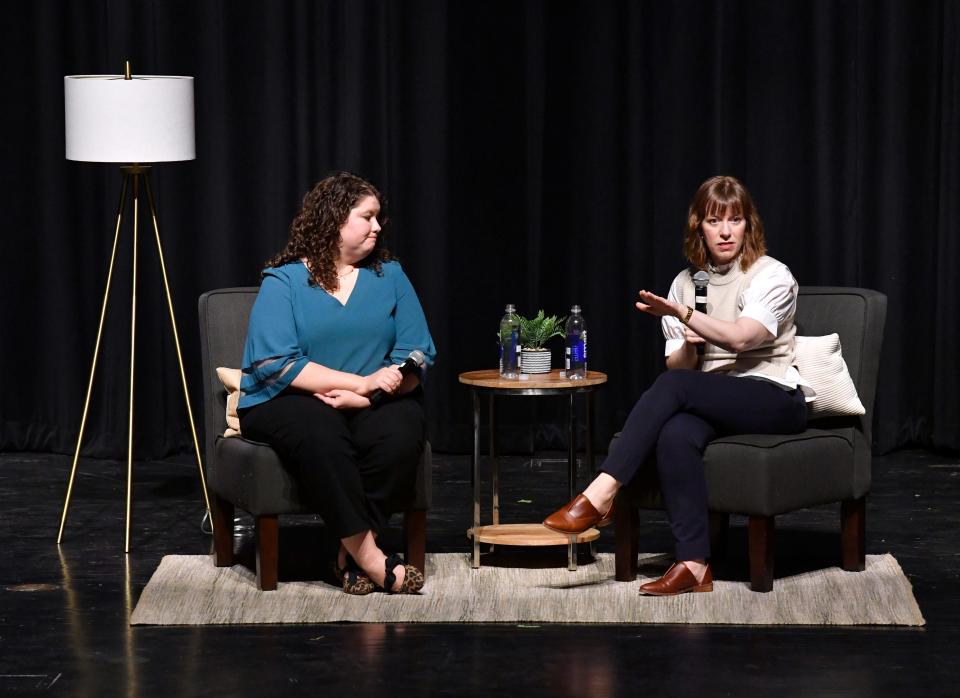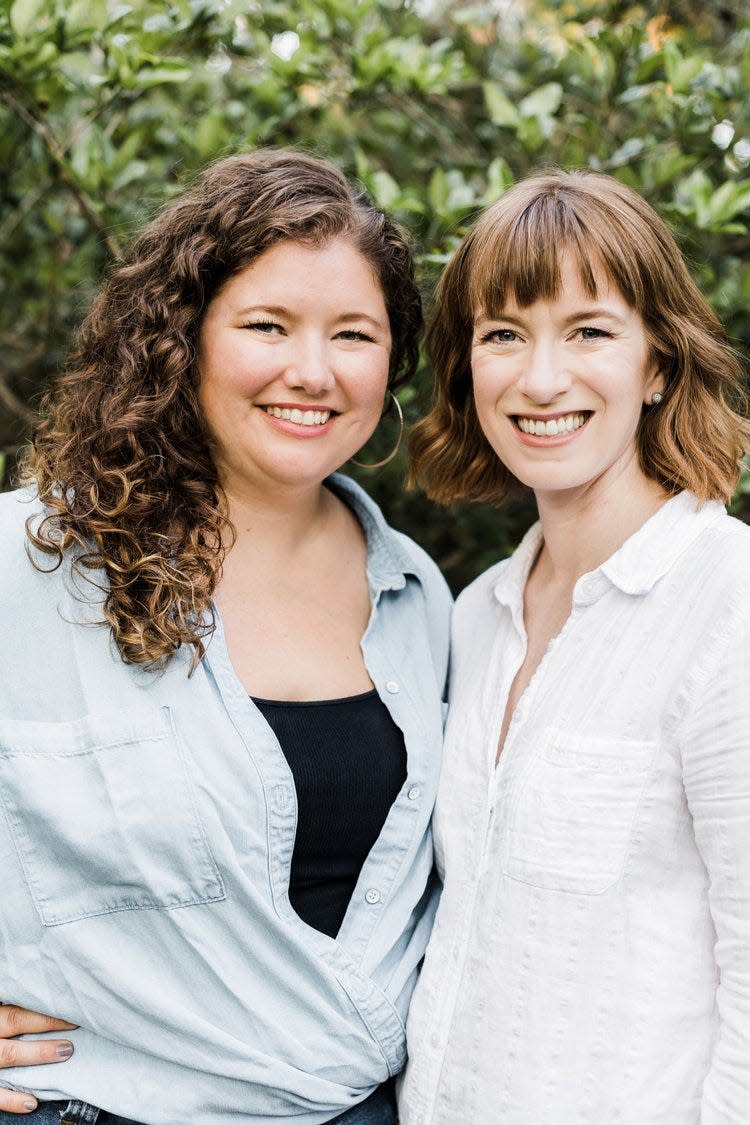'Pantsuit Politics' in person: Podcasters value connection, not deflection
Yes, they wore pants. Black.
Their host wore a dress.
It was all good.
Beth Silvers and Sarah Stewart Holland, hosts of the popular podcast "Pantsuit Politics," returned to Abilene Christian University last week as Women's History Month began to wind down. Their program has raised the bar - Apple podcasts rated "Pantsuit Politics" as one of the best in 2021 - and they talked a bit about women being considered as experts.

They spoke at morning chapel, then again in the newly renovated Boone Family Theatre.
Both women have law degrees and were undergraduates at Transylvania University. Coincidentally, their alma mater is playing for the NCAA Division III women's basketball championship Saturday in Dallas.
They did not mention basketball.
Holland served a term as a city commissioner in Paducah, Ken., where she lives.
Silvers, who lives in Union, Ken., worked for years in human resources as an executive.
Both are married and have children and dogs.
They team to explore the conflict that can affect political conversations. Their hourlong talk last week at Boone focused more on that. Their shorter talk earlier in Moody Coliseum related more to students, encouraging them to flexible as they set their course in life and to make sure that what they do matters - to them and to others.
The duo was fueled, they confessed, by a dozen large treats from Abilene's Hey Sugar cookies. They didn't eat all 12 but they tried each. Holland joked that there was even one in the box for her co-host.
Apparently, they are able to work around any conflict regarding cookies.
Connection, not deflection
Conversation, they said, can be "a pathway to connection." Yet, expectations before a conversation begins can be an obstacle.
"You might want to bring cookies to your next conversation," Holland said.
Before speaking in depth, a video produced at ACU was shown. Students randomly were asked hot-button questions, a spatula thrust at them instead of a microphone. The reactions were humorous, but telling. No one was prepared to answer, say, the question, "What are your thoughts on abortion?"
"Oh my gosh," was one answer.
"Oh ... wow," was another.
Another student could not answer if she was a liberal or conservative.

Thoughts on critical race theory?
"Oh no," another pained student answered, drawing laughter at Boone.
These issues, Holland said, take refection. Issues, such as abortion, are complicated, the podcasters said. One person may being talking about one aspect and the other person addressing another aspect. It's little wonder they may not connect.
Yet, these conversations must happen.
"We cannot know each other if we are not communicating on the things that matter," Holland said.
People need to regularly be "announcing to ourselves and others what our values are and allowing ourselves to be worked on by other people," she said. That prepares us to take good swings at the curveballs that life throws.
"We expect other people to get cold with us, we expect to disappoint other people and we expect the conversation to get intense, she said.
And so, as in the video, people deflect.
"We want to do things that matter, not avoid things that matter," she said. "You will not have a hard conversation without getting angry."
That is reality. If a person gets angry, upset, sad, believes she or he misspoke or doesn't convey what was intended, "that's normal," Holland said. And that's OK.
Understanding perspectives
Holland said she once believed conflict arose from misinformation.
"What it took me so long to learn was that the conflict was over different perspective," she said. That is the real beauty of making a connection.
"We grow and understand ourselves better in our perspective and the perspective of other people," she said.
It's not about winning the day with persuasion but sharing perspective, Holland said.
But remember that no two perspectives are the same.
It's better to be prepared for conversation than try to react in an "emergency." That, she said, happened when the nation faced the COVID-19 crisis.
"We didn't do a very good job with that," she said. "We didn't have the skills to navigate that situation well."
Preparation comes with knowing "I am willing to upset the person sitting across from me, I am willing to deliver news that is unwelcome," she said.
Holland offered advice about being informed. Find a daily, neutral source for news, she said. Bone up on what's happening to solidify your perspective to share with others.
"I am going to say something that makes me uncomfortable but feels true to me knowing it's going to make everyone else uncomfortable," Silver said. Get used to the emotion that comes with it.
Know thy 'enemy'
Holland said it's unreasonable to believe that there is a final destination where everyone agrees.
"That sets us up for a terrible expectation," she said.
To be considered is the level of the relationship. An intense conversation with someone on the street - as the spatula interviews showed - is difficult because a level of trust has not been established.
Consider that the other person may have something else going on in their lives "and they're really, really mad at their significant other and they're going to be bring that fire on you" in a political conversation.
"It's normal to run head first into someone else's terrible day," Holland said.
That goes back to perspective.
Trust is important, Silver said. And it's vital to practice this before launching into a more volatile topic.
For example, she said to the students in the audience, you determine your parents' role in your grades before you get into a discussion on Roe v. Wade.
Is there a shared purpose in a conversation? Holland said students may not have deep relationships with other students, for example, but their shared purpose is to get a degree and "learn about ourselves and the world better."
Bottom line, Holland said to avoid hard conversations, such as politics, because it makes a person uncomfortable, is not good.
Winning the day
There are two outcomes to expect today in political discussions - the other person is firmly grounded in their ideas or we should be able to get them "to come over to our side and see the light."
The reality is sometimes, you have to say that there is a lot to this discussion - let's start with what you know and what I know.
"Put what we know together and see how much we know about this (topic)," Silvers said.
That's what Silvers and Holland attempt to do. They talk about podcast topics and agree that they need to do research. Then, Silvers said, "we can have a reasonable conversation."
Offering that you may not know everything about a topic may disarm the other person.
It's OK, Silver said, for someone to get mad at you and you get mad at someone.
"I think if we did more of that, we'd have less cancelation," she said. "Instead of going away and saying, 'I'm done with this person.' We can handle being mad at each other.
"There is risk, but there are risks every day.
Still, remember that conversations are about topics, not the other person.
"It becomes dangerous when, no pun intended, identity becomes a trump card," Holland said. "That's not how you build connections."
Yes, women can be experts in politics
During a Q&A sessions, the duo was asked about how they are perceived as podcasters?
Holland said the media has treated them "like we're a curiosity. Two women talking ... how interesting."
"People will say, 'This is actually great,'" Silvers said. "You could've dropped the actually and I actually would agree with you."
Because they are in Kentucky, the more elite also have discounted them, she said.
Holland said that when she ran for office, she was asked who would take of her kids.
But men who are listening to them have thanked them for bringing them into a club they were not part of before.
Holland said people have opinions on things but there also are experts on those subjects.
"In politics, there is an unwillingness to recognized expertise. We do this all the time. I read the news, I analyze politics. I have expertise that you do not have."
"We do bring something to the table," Silvers said.
This article originally appeared on Abilene Reporter-News: 'Pantsuit Politics' in person: Podcasters value connection, not deflection

